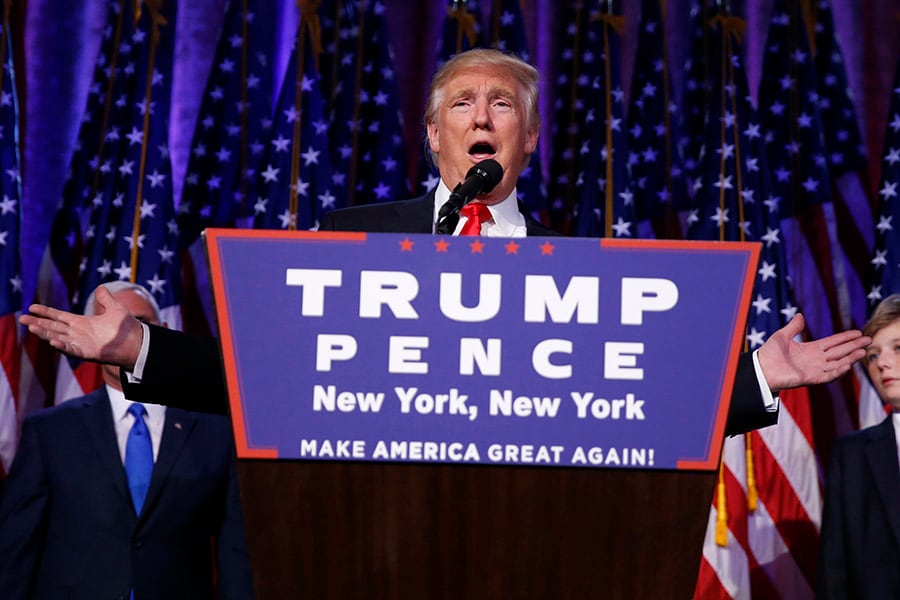
America Inc: Stirring calm in a stormy teacup
In an environment of socio-political uncertainty, US business leaders are reassuring anxious employees through messages of empathy and solidarity

Image: Carlo Allegri / Reuters
“Tolerance is for cowards. Being tolerant requires nothing from you but to be quiet and to not make waves, holding tightly to your views and judgments, without being challenged. Do not tolerate each other. Work hard, move into uncomfortable territory, and understand each other.” In an email to his team in October, AT&T CEO Randall Stephenson had addressed the uncomfortable issue of racial tension, which has heightened over the last couple of years in several pockets of America, taking cognisance of #BlackLivesMatter, a movement started in 2013 after police shootings of unarmed African-American men.
This wasn’t about just jumping on a Twitter trend.
Stephenson is one of several business leaders to go beyond the traditional messages of profitability, revenue targets and mergers & acquisitions in group addresses in recent times.
Top-down social messaging in an uncertain climate is becoming a norm to reassure anxious employees who are apprehending negative changes in their socio-cultural environment. Nowhere is this more apparent than in the US, which while grappling with racial strife, now copes with a divided political climate.
In the few days since the Republican candidate, Donald Trump, was voted the next president of the country, several heads of companies have shown little reticence in acknowledging employee fear and insecurity triggered by the campaign rhetoric of America’s president-elect.
The other factor, of course, is that these are all global companies, catering to diverse markets, with employees—particular in the tech verticals—from varying backgrounds. Beyond humaneness, there is also commerce to be considered. Little wonder that empathy was the running theme, in the days after.
The CEO of eBay, which has over 50 percent Asians in its tech functions, while around 40 percent of the overall staff is non-white, sent a group email, emphasising the company’s position as pro-diversity. “While we are a technology leader, our platform is centered around people—buyers, sellers and our employees… we will continue to advocate principles and policies that support the needs of the global eBay community, and I will continue to speak publicly about inclusion, trade and the positive role that technology can play in peoples’ lives around the world,” Devin Wenig wrote.
He made it clear that he wasn’t taking a political position but, at the same time, said, “…it’s clear to me that as a global technology leader, what we say and what we do matter. eBay was founded by an immigrant to the US. Pierre [Omidyar] built our business on the belief that people are basically good, and this enduring heritage is one of the reasons I’m proud to lead this company.”
Apple CEO Tim Cook too broadcast an all-hands memo to Apple employees in the US, saying, “While there is discussion today about uncertainties ahead, you can be confident that Apple’s North Star hasn’t changed. Our products connect people everywhere, and they provide the tools for our customers to do great things to improve their lives and the world at large.”
Trump has had a choppy relationship with Apple during the pre-election months, at one point even suggesting the company should stop manufacturing in China. But Cook was undeterred in his message. “Our company is open to all,” he wrote, “and we celebrate the diversity of our team here in the United States and around the world—regardless of what they look like, where they come from, how they worship or who they love.”
It wasn’t just the tech majors sounding out positive notes to their people. PepsiCo CEO Indra Nooyi did not hide her dismay at the election outcome, even asking for a “box of tissues” when asked how she felt about Hillary Clinton losing. “I had to answer a lot of questions from my daughters, from our employees. They were all in mourning. Our employees were all crying. The question that they are asking, especially those who are not white… ‘are we safe’, the women were asking… ‘are we safe’, the LGBT people are asking,” she said at the New York Times Dealbook Conference on the day after the verdict. “The first thing we have to do is assure everyone living in the United States that they are safe. Nothing has changed as a result of this election.”
Addressing similar concerns, Starbucks CEO Howard Schultz, an avowed Trump critic, asked his employees to “offer everyone in our stores and communities a place of inclusion and optimism”.
Regardless of their personal political stances, business leaders are striving for a positive note—perhaps, more of acceptance—while attempting to restore calm among those who anticipate the worst. Some are going the extra distance to wave the friendly flag, such as Amazon CEO and Washington Post owner Jeff Bezos who tweeted a mild congratulatory message to Trump, moving to a side the harsh criticisms of both his brands by the president-elect. IBM’s CEO Ginni Rometty went one step further, outlining the ways in which her company could help Trump achieve his plans for the country.
There is no right way to deal with an unprecedented political situation. In their own ways, these CEOs are attempting to smoothen the road ahead—and it is a four-year-long road. It is also one paved with rough-edged stones.
After all, fresh off the triumph, Trump has already reiterated his intention of sending home millions of immigrants and, yes, he has not forgotten the wall either.
In that context, sceptics may question the value of these CEOs’ words, even dismiss them as meaningless and hollow. But when empathy is transparently expressed and with little fear of consequence—exercising the much-vaunted freedom of speech upheld in democracies—it tends to transcend tokenism.
X





